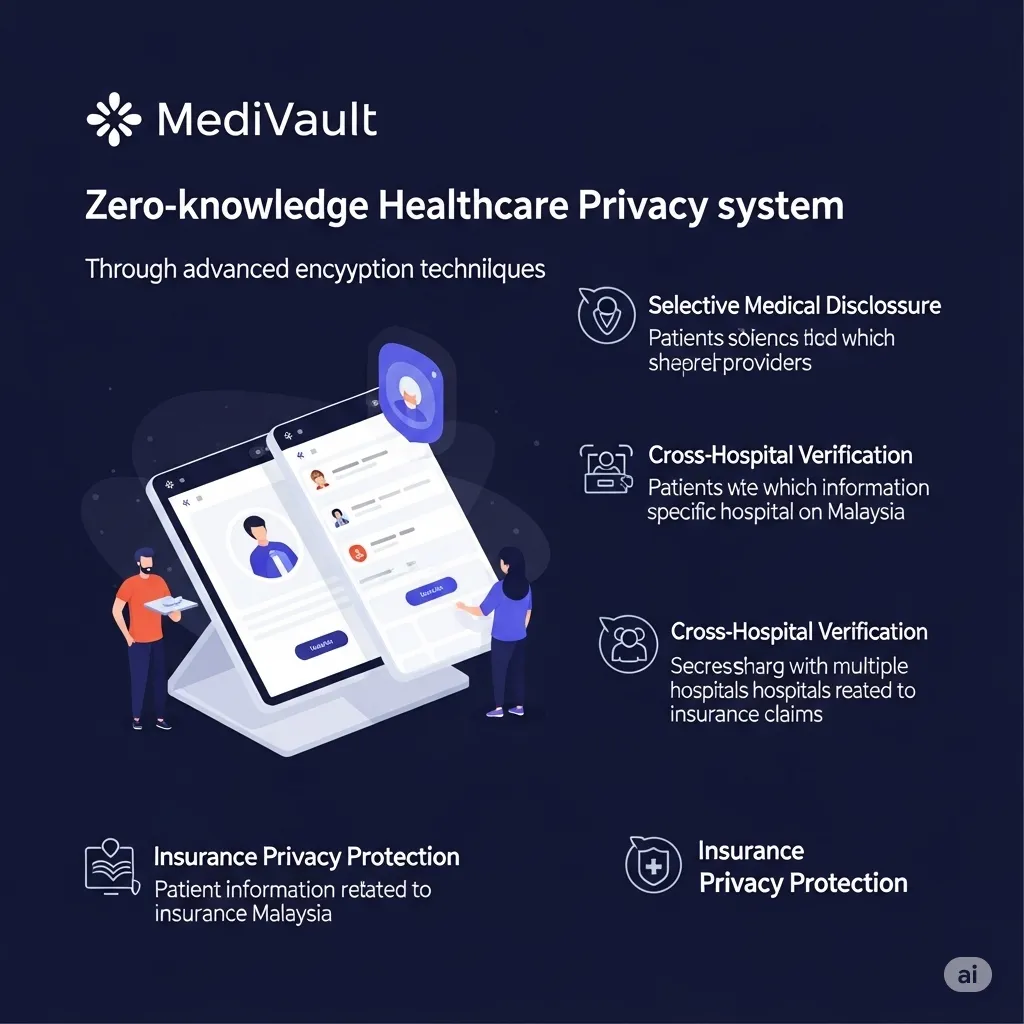Malaysia's Healthcare Privacy Crisis: 40 Million Patient Records at Risk
Malaysian healthcare faces a fundamental privacy paradox: patients need to share sensitive medical information across multiple providers, but current systems expose complete medical histories to every healthcare worker, insurance agent, and administrator who accesses the records.
Consider this scenario: A Malaysian executive needs to prove they're healthy enough for a life insurance policy, but doesn't want to reveal their history of mental health treatment to their employer's HR department. Current systems make this impossible - it's all or nothing.
MediVault: Zero-Knowledge Healthcare Privacy
Our research develops the first comprehensive zero-knowledge proof system specifically designed for Malaysian healthcare privacy needs. Instead of sharing complete medical records, patients can prove specific health facts without revealing underlying sensitive information.
Core Innovation:
Selective Medical Disclosure: Patients can prove "I am diabetic-free" or "I completed cancer treatment 5 years ago" without revealing any other medical conditions, treatments, or personal health information.
Cross-Hospital Verification: Doctors can verify critical medical information (allergies, current medications, emergency contacts) without accessing a patient's complete medical history from other hospitals.
Insurance Privacy Protection: Prove insurability requirements without exposing mental health records, genetic information, or other sensitive medical data to insurance companies.
Research Focus: We're developing cryptographic protocols specifically adapted for healthcare data structures, Malaysian medical coding systems, and local privacy regulations (PDPA compliance). This isn't theoretical - we're building working prototypes with actual Malaysian hospitals.
Risks and challenges
Healthcare Data Sensitivity and Security Requirements
Medical records contain the most sensitive personal information imaginable - mental health histories, genetic predispositions, reproductive health, and chronic conditions. Any cryptographic system handling this data requires unprecedented security standards. A single vulnerability could expose intimate health details of thousands of patients.
Security Approach: Multiple independent security audits, formal verification of all cryptographic protocols, and collaboration with international healthcare cryptography research groups. Implementation of defense-in-depth architecture with multiple encryption layers.
Hospital System Integration Complexity
Malaysian hospitals use different electronic medical record systems - some use proprietary software, others use international systems like Epic or Cerner, and many smaller clinics still rely on paper records. Creating zero-knowledge proofs that work across this fragmented landscape presents significant technical challenges.
Integration Strategy: Development of standardized healthcare data translation layers, pilot testing with technologically advanced hospitals first, and gradual expansion to smaller healthcare providers with simplified interfaces.
Medical Professional Trust and Adoption
Doctors and nurses are naturally conservative about patient data systems - they need to trust that zero-knowledge proofs provide accurate medical information. If a patient proves "no known allergies" but the proof system fails, the consequences could be life-threatening.
Trust Building: Extensive testing with medical professionals, transparent audit processes, clear limitation documentation, and fail-safe mechanisms that default to full record sharing when proof verification fails.
Regulatory Compliance with Malaysian Healthcare Laws
Malaysia's Personal Data Protection Act (PDPA) and Ministry of Health regulations create specific requirements for medical data handling. Zero-knowledge systems must comply with audit requirements, data retention policies, and patient consent mechanisms that weren't designed for cryptographic privacy systems.
Regulatory Strategy: Early engagement with Ministry of Health digital health teams, collaboration with Malaysian Medical Association on professional standards, and development of compliance documentation frameworks.
Patient Education and Usability
Most patients don't understand how zero-knowledge proofs work, but they need to trust the system with their most sensitive information. Creating user interfaces that are both cryptographically secure and intuitively understandable presents significant design challenges.
User Experience Focus: Extensive user testing with diverse patient populations, development of clear privacy benefit explanations, and integration with existing patient portal systems that users already understand.

